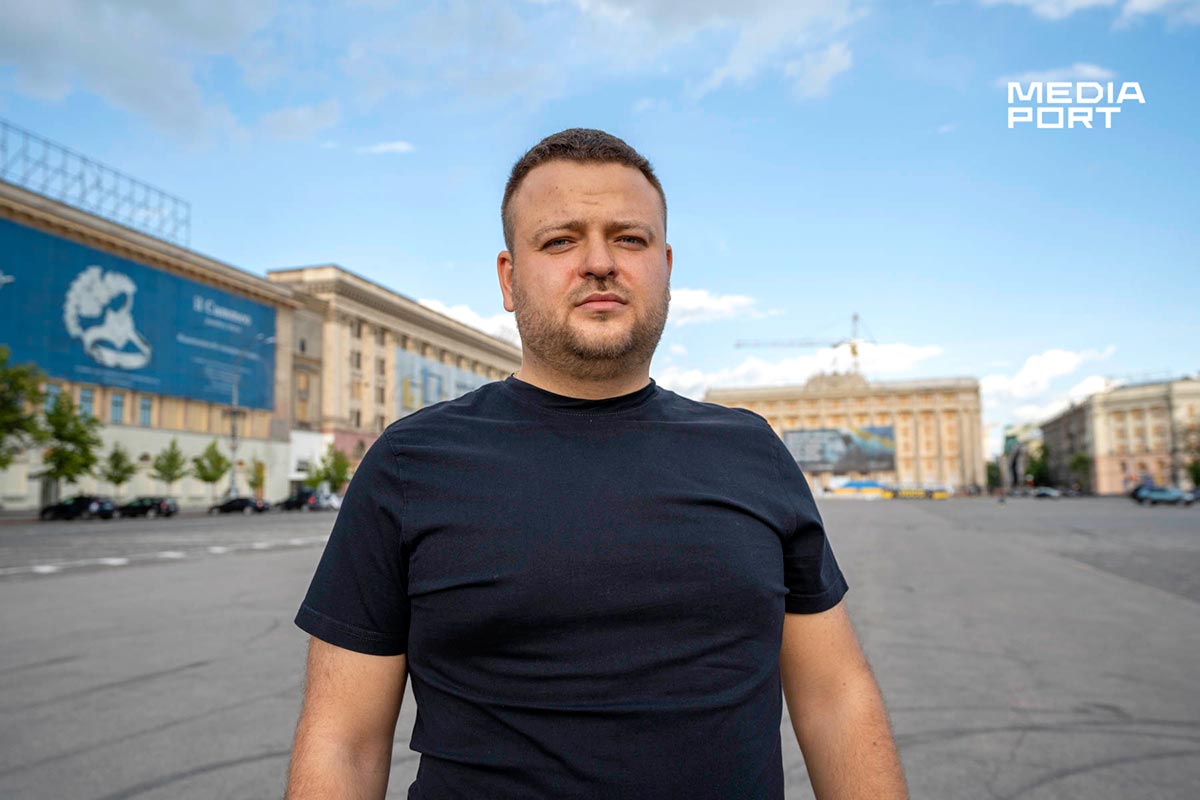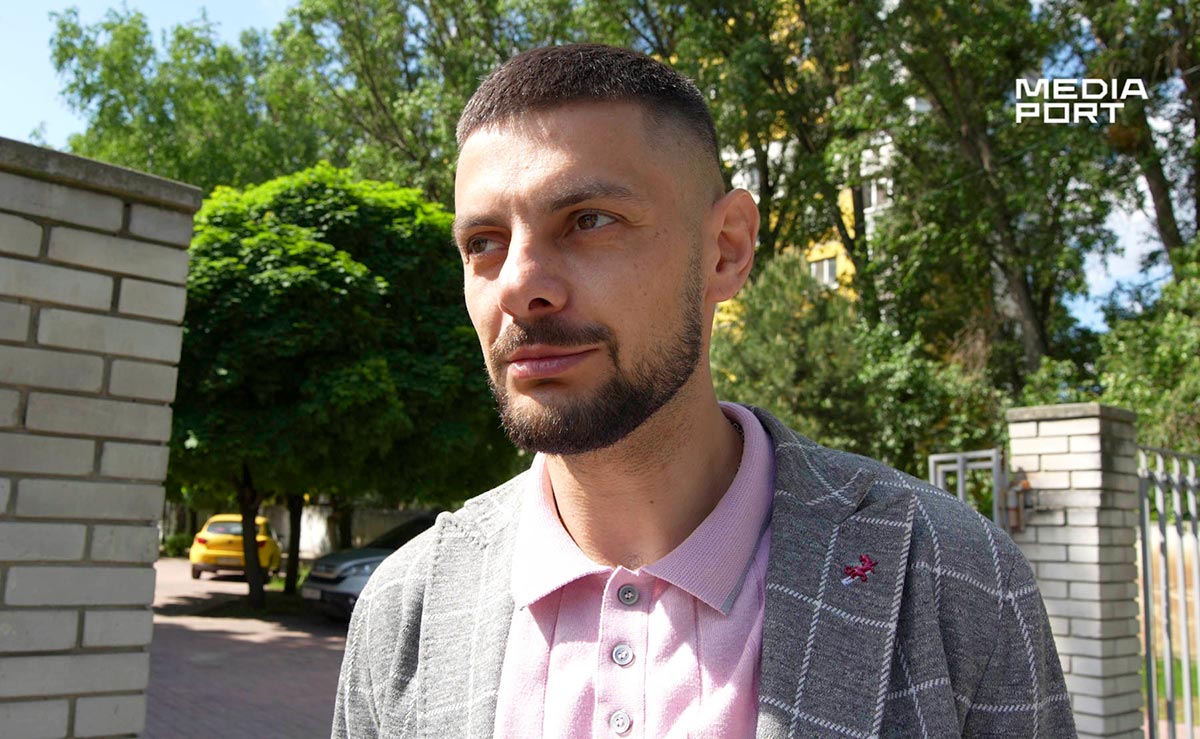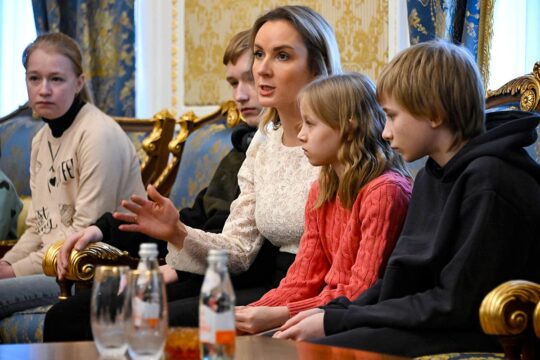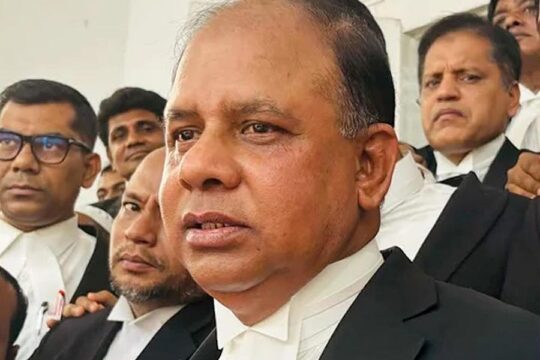Getting to a hearing in the case against Oleksander Oleksandrovych Radchenko, also known as “San Sanych”, is a two-hour drive on the Kharkiv-Dnipro highway. The accused is likely to take the same route. The ruling of Ukraine’s Novomoskovsk City District Court, about 30 km northeast of Dnipro, which released the businessman from detention, stated that Radchenko must not “leave the location of his actual residence”, i.e. Kharkiv, without the court’s authorisation.
Radchenko was the founder and CEO of Kupiansk Milk Canning Factory. He was also a member of the Kupiansk district council, as a representative of President Zelensky’s party. The Novomoskovsk court received territorial jurisdiction over the Kupiansk case for the duration of martial law. It is impossible to resume the proceedings on site: according to the General Staff of the Armed Forces of Ukraine, intense hostilities are ongoing in the Kupiansk area, with the Russian army attacking Ukrainian positions, as well as shelling towns and villages.
According to Dmytro Chubenko, spokesperson for the Kharkiv Regional Prosecutor’s office, his office tried to object to the conditional release measure. “Since this person held a high position in a major local company, since many witnesses are employees of this company, this person can influence witnesses through his connections and resources but can also distort evidence that proves his guilt,” Chubenko said. “This person, although of a certain age, was still in charge of a major company, participated in drafting contracts for the supply of products to the Russian Federation and the so-called LNR [Luhansk self-proclaimed republic in Eastern Ukraine]... In other words, he was working very actively, that is why our position was to keep him in detention.”

A rare case of conditional release
Radchenko's lawyer Ihor Stepanov responded that he had “no right to disclose Oleksandr Oleksandrovych’s health condition. He is healthy enough to attend court hearings. He can and in any case will appear in court, as he is obliged to appear at every court hearing. And he will comply.”
In court, Radchenko looks upbeat and confident indeed. At first impression, he does not look like a man who may not have “the ability to fully respond to the demands of the world around him,” as the court once described him.
The current legislation gives the court the right to set bail or not when choosing a preventive measure in "collaboration cases", said Roman Chumak, a lawyer and co-founder of the NGO Pro Justice, and coordinator of the Kharkiv Regional Council for Justice Reform. “The court must take into account all possible risks when choosing a preventive measure of detention without bail. Of course, the court must also take into account the health of the accused, his age and the presence of chronic diseases,” Chumak said. “Taking into account the court practice of choosing and extending preventive measures in this category of cases, it should be mentioned that the possibility of bail as an alternative to detention is not available in all cases. This is a rare occurrence rather than a general rule. But I would like to point out that in each case the court assesses the health of the accused and the ability of the state to provide medical care in places of detention.”
The invasion of Kupiansk by Russian troops
The Kupiansk Milk Canning Factory is located on the left bank of the Oskil River, less than ten kilometres from the frontline. The products of Kupiansk Milk Canning Factory are known all over Ukraine. Under the ’Zarichia’ brand (originally known as ’Zarechie’ in Russian), the company produced condensed milk and more than 45 other dairy products with a recognisable bunny logo. The factory’s product line was expanding, and Kupiansk Milk Cunning Factory’s products were publicised, until the Russian army started a full-scale war in February 2022.
A few days after Russia’s full invasion began, Russians took control of Kupiansk, stopped a pro-Ukrainian gathering and detained some of its participants. The fate of some of them is still unknown. “On February 27, the katsaps [pejorative word for “Russians”] were already in Kupiansk. They immediately arrested all the ATO [the area where Ukrainian separatists were active] veterans, they were turned in, by lists. Our mayor greeted them, showed them around and accommodated them,” Kupiansk volunteer Oleksandr K. recalled. (MediaPort has chosen not to publish his name for security reasons.)
Oleksandr K. survived detention and a house search, then left Kupiansk through country roads to reach the government-controlled territory of Ukraine. “Thankfully, because we knew all the roads, we managed to get to the other side of the Oskil. And we drove across Lyman, where for the first time in my life I wanted to hug our police officers because they were standing at a checkpoint with a Ukrainian flag,” he said.
A Ukrainian patriot?
Radchenko’s lawyers refer to their client as a Ukrainian patriot who was paying military tax and was helping ATO soldiers before the full-scale war, which the Kupiansk volunteer confirmed. “I know that he [Radchenko] was distributing milk, that’s for sure. When the electricity was cut off, they continued to milk the cows, he was giving it to people for free. I know that before the war he helped the ATO soldiers,” Oleksander K. said. “On the other hand, before the war started, he had contracts with Russia. He named the trademark not ’Zarichia’, but ’Zarechie’. By the way, it was rumoured that his brand had been stolen from him because people in the Luhansk oblast had started producing these same products as if they were Ukrainian-made. With the same rabbit or bunny logo drawn on them,” he added.
Vadym Chaharovskyi, head of the Union of Dairy Companies of Ukraine, also defended Radchenko. “He had a choice: run away like everyone else and leave the factory or save it. Since this factory and the team were like family to him, his choice was obvious to all of us. He stayed because he was responsible for his employees and milk-supplying partners. If the factory had shut down and stopped processing milk, the suppliers would have been forced to slaughter their cows. This would have resulted in great economic losses,” he told Telegraf in March 2023.

Contracts with the Russians and seized roubles
But according to the investigation, Radchenko was building his business with the Russians and did so voluntarily. According to the prosecutor’s office and the SBU [Ukraine’s intelligence services], the renewed registration of the Kupiansk Milk Canning Factory with the Russians’ “tax office” and the contracts concluded with them constitute evidence of the CEO’s cooperation with the Russians. “To accomplish this, the head executive registered the joint-stock company with the occupation administration’s so-called ’tax office’. Then he opened accounts in one of the Russian banks and converted all the company’s funds into roubles. This way, he ensured regular supply of industrial volumes of dairy products for the needs of the invaders in the temporarily occupied territory of eastern Ukraine,” the SBU reported. “The accused concluded a supply agreement with the so-called Military and Public Administration of the Kupiansk district for the supply of products totalling more than UAH 3.5 million [about 80,000 euros]. In addition, from May to September 2022, the CEO signed contracts for the sale of dairy products with companies in occupied Luhansk worth about UAH 100 million [about 2,2 million euros],” the prosecutor’s office informed.
During the investigation searches, Russian roubles were seized from the accused. “This is a specific factor that indicates work and cooperation with the occupiers during the occupation, so the money was seized, and this matter will be voiced in court,” Chubenko, from the Kharkiv Regional Prosecutor’s office, said.
Kupiansk mayor Andriy Besedin told MediaPort that the Kupiansk Milk Canning Factory is now closed and partially damaged by shelling. “I’m not ready to say [whether all employees have been fired], it’s a private company. I know that the head of the company is under investigation, the company was seized. Of course, the absence of such a company, as well as the others, affects the city, the taxes. Not a single company operates in the Kupiansk community,” Besedin said.
“He did not collaborate with the aggressor country”
Radchenko’s lawyer refused to talk about the factory’s activity and its future. The defence is reluctant to comment on the specifics of the case until the trial is over. At the same time, it claims that the prosecutor’s office has no evidence and is delaying the trial. “We will provide all the answers to your questions or comments after the court’s final decision on the case. Mr. Oleksandr Oleksandrovych has not testified in court so far,” Stepanov said, explaining his client’s unwillingness to talk. Asked if he could at least react to the accusation that his client had collaborated with Russia, he replied: “I am stating that he did not collaborate with the aggressor country.”
“We are at the stage of questioning witnesses,” he added. “To date, none of the [prosecution’s] witnesses who have been interrogated have confirmed the charges brought by the prosecution. In our opinion, the prosecutor is delaying this case and not bringing the witnesses to the courtroom, as it is aware that such testimonies do not help them.”
But for Chubenko, the defence’s position is manipulative. “As of now, about 10 witnesses have been interrogated, I cannot say the exact number of witnesses, as this is a tactic of the prosecution. We will provide information about those who will testify during the trial,” he said.
Waiting for witnesses
But once again, witnesses did not appear at the hearing on May 3, 2024. “The Kupiansk District Prosecutor’s Office received a report from the Kupiansk District Police Department stating that they were unable to execute the court order to bring them in,” prosecutor Dmytro Reshetnyak said, adding that he requested the fulfilment of the court order and clarification as of why it was impossible to execute it. He asked the court to issue another order entrusting the case to operatives of the SBU: “I believe that under martial law, SBU operatives have more capacity to carry out the court order.”
The defence objected to the involvement of the SBU but did not object to the court order. “I would like to draw the court’s attention to the fact that the prosecution has not provided witnesses for the third time. So next time, if there are no witnesses, I will be compelled to ask the court to set a deadline for the prosecution to provide evidence, as stipulated by the Criminal Procedure Code,” Stepanov said.
“The court always entrusts the prosecutor with the execution of such order. The manner of its execution is the prosecutor’s responsibility. In addition, the court draws the prosecutor’s attention to the issue raised in the court hearing that the defence may request the court to set a time limit for you to present your evidence,” judge Inesa Krokhmalyuk said. “Please note that we have been considering this case for a long time. Please do not force the court to set these deadlines for you. Full attention is paid to what is happening in the area where the witnesses are right now.”
“They should have brought witnesses, and we would have listened,” Radchenko said after the hearing. “Because they say what they say. And we want to hear the witnesses – you, us, the lawyers, and the court.”
This report is part of our coverage of war crimes justice produced in partnership with Ukrainian journalists. A first version of this article was published on the "Mediaport" website.







